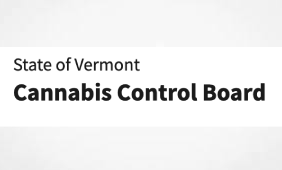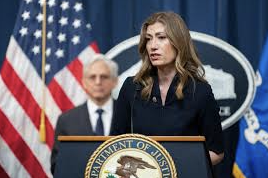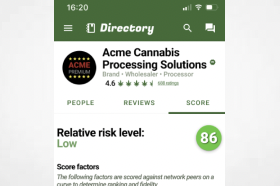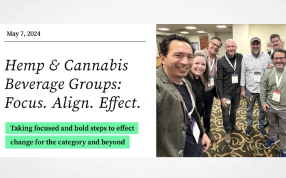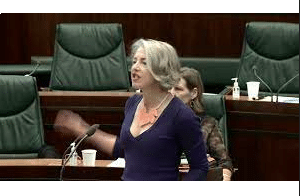The Tasmanian Greens have re-published the Hansard of the exchange…
Police, Fire and Emergency Management – Drugs
 |
Dr Rosalie Woodruff MP – Thursday, 9 September 2021Tags: Drug Policy, State Budget |
Dr WOODRUFF – Minister, according to the Tasmania Police annual corporate performance reports, the proportion of drug offenders who have been given drug diversions by Tasmania Police has declined every single year under your Government. In the annual year 2013-14, a total of 693 drug offenders who represented 28 per cent of people charged with drug offences were diverted from the court process. In 2020 21, this has plummeted to 316 people being diverted, which is just 13 per cent of all people charged. Have you or previous police ministers indicated to the police that you would like to see more prosecutions and less diversions and, if you haven’t, how do you explain this dramatic reduction in an effective way of removing people from a criminal pathway?
Mrs PETRUSMA – I can’t comment for previous ministers. I know the department is working on a new Tasmanian Drug Strategy, which is being managed by the Department of Health and driven by the interagency Drug Policy Committee.
DPFEM is a representative on that committee. The new strategy will continue to utilise the National Drug Strategy – the principal strategic document outlining a national commitment to harm minimisation. All available drug data is being considered when informing areas for action under this new strategy.
Tasmania Police will continue towards efforts to meet the action areas in the new strategy through investigating and disrupting the production and supply of illegal drugs. This includes the use of detector dogs and charging offenders, while also diverting eligible users to health and treatment providers in line with the Tasmania Police Illicit Drug Diversion Initiative.
Dr WOODRUFF – How do you explain this dramatic reduction in people being diverted?
Mrs PETRUSMA – You will have to ask the Commissioner that one.
Mr HINE – Yes, we have observed that decrease – and I will hand over to Mr Higgins in a minute to explain further. Diversion is at the core of what we do, especially with young people. We divert nearly 50 per cent of young people away from the court system because we know diversions do work. We have reviewed the process as well. We know there’s various aspects to the drug diversion approach itself.
We’re implementing some of the review recommendations into the drug diversion process. We understand it’s also a health issue. We want to get people away from drugs and through a health response. I’ll hand over to Mr Higgins to go into a little bit more detail about the diversion process.
Mrs PETRUSMA – Getting back to your question, Dr Woodruff, I want to clarify that the Commissioner is independent. I don’t instruct the Commissioner what to do in operational areas. The inference was that I have told Tasmania Police to stop diversion That has not happened, and I want to ensure that is on the record.
Dr WOODRUFF – I’m really pleased to hear that. Thank you.
Mr HIGGINS – One of our strategies in Tasmania Police is to target the high end drug dealers. That has been a shift in our focus, more from the diversions and not prosecuting anybody that’s possessing and using. It’s not a blanket rule, but we’re targeting the actual dealers who are causing the greatest harm.
Our recent drug diversion initiative is an adult program. My instructions to my commands have been to target the dealers as opposed to the users, and that has seen a dramatic drop. We’re reviewing that now, with the drug strategy – whether we need to do more in the diversion space. That’s something we will look at, as the strategy comes out.
As far as youth goes, they are dealt with under the Youth Justice Act, and so, they don’t come up in these diversions. We can only give level 1 and level 2 diversions in relation to cannabis. Our focus has been more towards the pills and powders that are causing harm in the community.
Dr WOODRUFF – Thank you. Minister, I’ve just heard from the Commissioner that acknowledgment that drug diversions are very effective and they are also a health response. I’ve also heard the welcome news that we are focusing more on the dealers, not the users. However, the fact remains – drug diversions are plummeting, and I haven’t heard why. It’s effective; it’s better for people’s health; it keeps people out of the courts and, ultimately, prisons; but it’s not happening. Why isn’t it happening?
Mrs PETRUSMA – That’s an operational matter so I will hand over to the Commissioner.
Mr HINE – If we come across someone using minor amounts of drugs, we will either divert or caution because we’re putting our resources into those high end dealers. Therefore, we’re not targeting users at the lower end because we’re putting our resources in dealing with the higher end. When we come across it we have to take action to confiscate, caution or a diversion.
Ms ADAMS – A lot of diversions arise from music festivals. Obviously, we’re wanting to divert people from the criminal justice system who are attending festivals. There haven’t been any festivals over the last 12 months, as a result of COVID-19, so that has also impacted on those figures.
Dr WOODRUFF – Minister, when just last week there has been a proposal for the decriminalisation of small amounts of cannabis, your Government, Ms Archer, Attorney General immediately rejected that proposal. In the article former chief Magistrate Michael Hill said many magistrates would agree that reform was a sensible one. He makes the point, he says minor cannabis offences are a waste of the legal system’s time and we are dealing to a large extent with young people so, the criminalisation of their behavior can have a lasting effect. He has claimed around 80 per cent of drug cases before the court are for personal use situations and said on any day in the Magistrate’s Court of Tasmania you will see more than 20, 30 maybe 40 people with charges of that nature.
What do you say to former magistrate, Michael Hill? This is a damning indictment and stands in stark contrast to the comments the Commissioner just made about not focusing on young people. What do you say to Magistrate Hill’s comments about it being a waste of time and it is criminalising young people?
Mrs PETRUSMA – The legislation does not come under this department. It is in a different department. In regards to whether cannabis is an illegal drug or not. The police treat medicinal cannabis in the same manner as prescribed medications meaning that if the use of medicinal cannabis product does not impair a person’s ability to drive, it is legal to do so.
Dr WOODRUFF – That is not actually true.
Mrs PETRUSMA – Sorry?
Dr WOODRUFF – No, that is not the case.
Mrs PETRUSMA – Well, that is the case. Police treat medicinal cannabis in the same manner as other prescribed medications, meaning if you use medicinal cannabis and it does not impair a person’s ability to drive it is legal for them to do so.
Dr WOODRUFF – But people can be charged with any limit in their body if they have got a drug test.
Mrs PETRUSMA – This is in regards to medicinal cannabis because that was changes to Tasmania’s Controlled Access Scheme where we have adopted the other jurisdictions have made medicinal cannabis more accessible. Using it under the Controlled Access Scheme, the person does not commit an offence in respect of driving with the drug in their body.
Dr WOODRUFF – Can you tell me what is the proportion of people who come to the court each year? We have the figures of total prosecutions and the diversions. Former magistrate, Michael Hill, has alleged about 80 per cent of people in the day would be coming from minor drug related offences. What is the proportion of people who are presenting for personal drug use offences and can you tell me what that is by age group please? We have talked about youth so, it would be interesting.
Mr HINE – We are finding the number of people, especially young people, to the court is going down. The courts would probably have that information and it is about minor use as well. From a policing perspective, we have to enforce the law if we come across illegal drugs then obviously we have to enforce that and seize that. We have absolutely no choice; that is what the law tells us to do, but if we can give a Diversion Notice and especially for children, we will divert where we again.
Those figures are with Department of Justice and Courts. We only know the ones we charge.
Dr WOODRUFF – That is what I mean. I should have been clearer. What is the proportion of people who are being charged with drug offences are being charged for personal drug use offences?
Mr HINE – Again, we can give you the numbers and Mr Higgins will have the numbers of persons we have charged with relation to drugs. It is up to the court to decide what is for personal use. We cannot go through and determine what is personal use; that is for a court to decide or make a decision with relation to that.
Dr WOODRUFF – But you make the case to the court of the actual amount that was seized on a person, so you would know. Surely, you keep figures about whether that was personal or trafficable because that is just the line, isn’t it?
Mr HINE – That is a different argument again about whether it is a trafficable quantity. Yes, we definitely keep those figures. If it does not meet that, whether it is for personal use or whatever it may be for, that is a matter for the courts and the defendant to argue that case. We can give you the numbers that have gone to court and the charges, but what people use it for. We will present that evidence, but of course we cannot go through all the evidence and decide what a court will decide.
Dr WOODRUFF – I understand.
Mr HIGGINS – In the last financial year there were 2508 people proceeded against for drug offences, that is not broken down into the different categories. The year before it was 2813 and the year before that 2734. It has been coming down in that respect.
Dr WOODRUFF – Sorry, minister, I know the total number, it is about the break down for what people were charged with, whether it was personal levels of drug use or not. I understand this does not necessarily mean that is what it ends up in Court.
Mr HINE – There is no such charge as ‘for personal use’; it is about ‘the possession of’. That is not for us to determine. There is no charge for personal use. There is a charge for possession, whether it’s trafficable or for personal use or whatever it may be.
Mrs PETRUSMA – It sounds like you need to put a question on notice to the Attorney General to get the court data.

